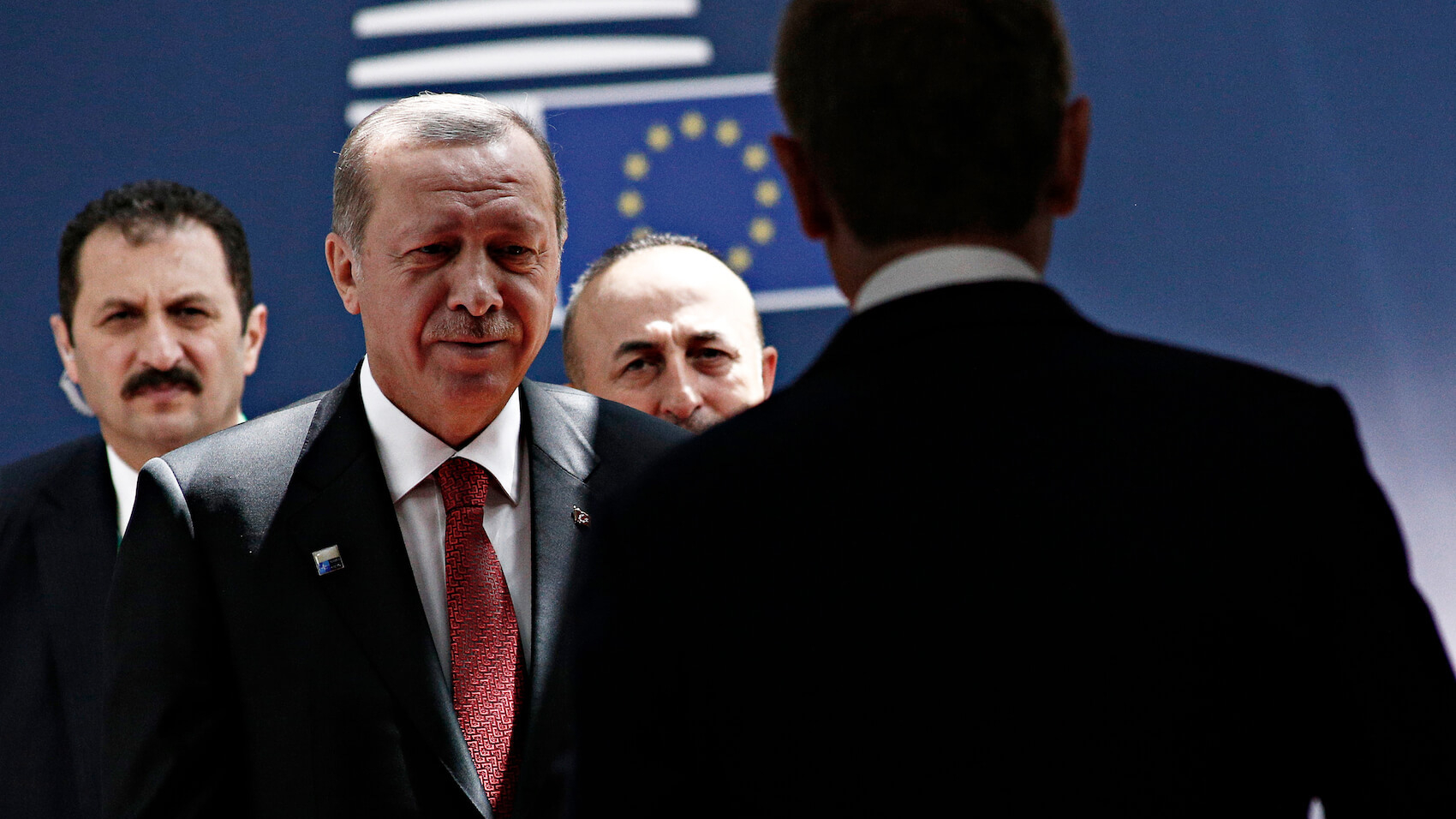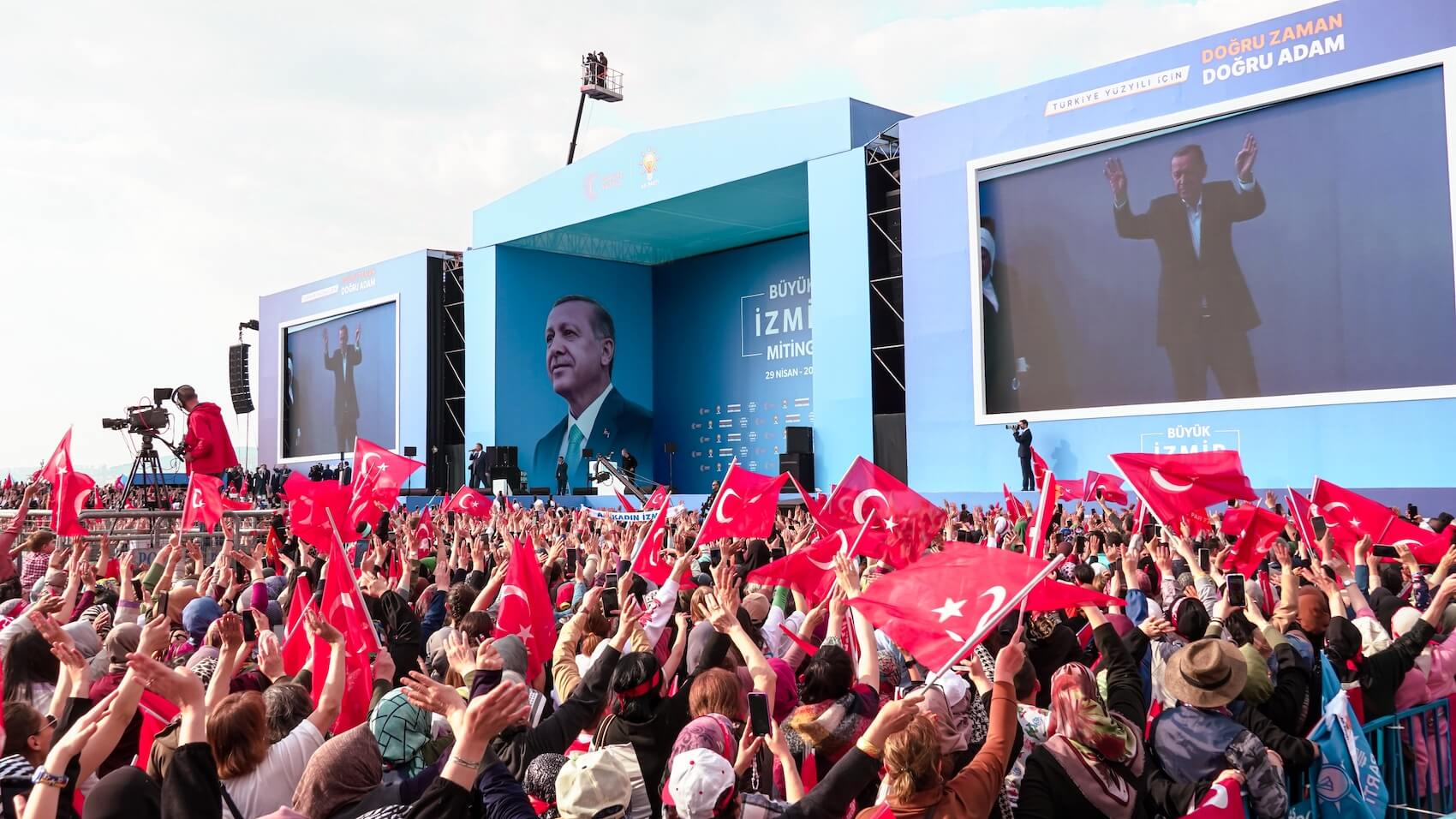While a new term for Erdogan will bring more challenges, Turkey will remain a crucial interlocutor for the EU on many issues, including migration, energy, and regional security, particularly against the backdrop of Russia’s war in Ukraine. Despite EU has clearly determined that Turkey under Islamist populist Erdogan has been less democratic and more authoritarian, the Union falls short of making serious warnings in this regard.
Turkey’s Islamist-populist president Recep Tayyip Erdogan beat his rival Kemal Kilicdaroglu, the chairman of the main opposition party CHP and the candidate of six-party opposition bloc in the elections held on Sunday. Despite the twin earthquakes that killed more than 50.000 people in early February, a looming economic crisis, and the deepening polarization, Erdogan managed to secure another five years at the helm of Turkey. Seemingly, his Islamist populism entrenched with authoritarianism paid off at the ballot box and enabled him to enter the third decade of his rule which means he will be ruling Turkey for a quarter of a century. While he received 52 percent of the vote, his challenger Kilicdaroglu got 48 percent.
The Turkish Parliament, whose members were elected in the first round of the vote on May 14, 2023, is deemed to be the most conservative-nationalist House in the hundred years of the Republic. Combined with increasingly authoritarian regime of Erdogan, the future does not bode well for almost half of the population who voted for the opposition. As BBC put it ‘the strategic NATO nation’ had chosen its path, most voters opting for a seasoned autocrat rather than an untested democrat in the form of Kilicdaroglu. While Kilicdaroglu stressed the need to revitalize the relations with the European Union (EU) – which is frozen for almost a decade – and revise the migrants deal that was agreed in 2016, Erdogan barely mentioned the EU in his election campaign. For Erdogan, the relationship with Brussels is run on a transactional basis.
For the first round of elections of May 14, the joint observation mission from the OSCE Office for Democratic Institutions and Human Rights (ODIHR), the OSCE Parliamentary Assembly (OSCE PA), and the Parliamentary Assembly of the Council of Europe (PACE) found that the legal framework did not fully provide a basis for holding democratic elections. Frank Schwabe, head of the PACE delegation, underlined that Turkey did not fulfil the basic principles for holding a democratic election. “Key political and social figures are in prison even after judgments of the European Court of Human Rights, media freedom is severely restricted and there is a climate of self-censorship. Turkey is a long way from creating fair election campaign conditions,” said he. For the second round, Schwabe reiterated his position that the second round also took place in an environment that in many ways did not provide the conditions for holding democratic elections. Selahattin Demirtas, the former leader of the second largest opposition party, pro-Kurdish HDP is still in jail despite the ruling by the European Court of Human Rights that he should be freed with immediate effect.
The election on Sunday was closely watched by European Union, US, the Middle East and Russia. The point was made by Baroness Cathy Ashton, the EU’s former foreign policy chief.
“What happens in Turkey in terms of its democracy and in terms of its place in the region has a huge impact on Europe, on Asia, and of course on all of the global issues that we’re all grappling with. So, it is really important,” said she. And the Economist, the British weekly announced on its cover that the Turkish election was the most important of 2023. “Most important, in an era when strongman rule is on the rise, from Hungary to India, the peaceful ejection of Mr Erdogan would show democrats everywhere that strongmen can be beaten,” wrote the weekly. There was hope if Erdogan could be defeated at the ballot box, it would send a message to all the populist authoritarian regimes across the globe.
Although it was not unexpected that Erdogan would use a populist discourse to demonize his opponents, what is surprising was Kilicdaroglu’s embrace of populist rhetoric right after it became obvious that the presidential election would go to a run-off on May 28. Kilicdaroglu who lost the first round of presidential elections by almost 5 percent of the vote immediately changed his course and employing an ethnonationalist strain, swerved right. He promised to send home millions of Syrian refugees and doubled down the nationalist tone in his rhetoric. According to an Al Monitor/Premise poll which was conducted between May 19-23 across Turkey, 71 percent of the respondents favored an imminent return of refugees. The economy and refugees stood out as the top two issues that the respondents deemed challenges for the country. To win the nationalist votes, Kilicdaroglu signed a protocol with the leader of the far-right Victory Party, Umit Ozdag. Ozdag proclaimed the return of the refugees as the number one priority for his party. The protocol promised to return all of the refugees within a year. Right after the first round of elections, Kilicdaroglu claimed Erdogan had brought 10 million refugees to the country and that number would increase if he would remain in power. Adopting a fearmongering style, Kilicdaroglu implied that ‘our daughters’ would not be able to go around safely if the Syrian and other refugees would stay in Turkey.
While Kilicdaroglu was busy in forming alliances with the far-right parties, Erdogan, too, was seeking to enlist the support of religious populist and far-right parties. Erdogan who won five parliamentary elections, two presidential polls and three referendums, this time around, felt he could be beaten by the opposition. Thus, he agreed to create an alliance with the Islamist New Welfare Party and the Kurdish Islamist Huda-Par (Free Cause Party). Huda-Par is essentially the political projection of Kurdish Hizbullah, an Islamist organization, unrelated to Lebanese Hezbollah, known for its gruesome murders in the 1990s. These two parties have declared that they want Turkey to withdraw from the Istanbul Convention and the repeal of the Law 6284 which basically provides protection for women against violence. Moreover, Erdogan went ahead to court far-right leader Sinan Ogan campaigning heavily on terrorism. In the large meetings which hosted tens of thousands of people, he showed fake videos that falsely implied his opponent Kilicdaroglu had links with outlawed Kurdistan Workers’ Party (PKK).
Cultural Metamorphosis
Besides politics, Erdogan has successfully pursued a populist political ideology together with cultural populism. Erdogan’s authoritarianism is more than ballot box as he employs television and music, monuments and memorials that have been prime levers of a political project, a campaign of cultural ressentiment and national rebirth. As the New York Times reported it, this cultural metamorphosis reoriented national culture and promoted a nostalgic revival of the Ottoman past ‘sometimes in grand style sometimes as pure kitsch.’.
What Next With EU?
While a new term for Erdogan will bring more challenges, Turkey will remain a crucial interlocutor for the EU on many issues, including migration, energy, and regional security, particularly against the backdrop of Russia’s war in Ukraine.
Turkey has applied EU back in 1959, was declared candidate in 1999 and started accession talks in October 2005. It is the longest history of a candidate country ever. It has been 18 years since the accession talks started however barely16 chapters out of 35 have been opened and only one chapter has been provisionally closed. Former French President Nicolas Sarkozy and former German Chancellor Angela Merkel together with the Greek Cypriots have been instrumental in blocking the accession talks. Erdogan’s authoritarian populist streak has also been pivotal in European Council’s decision to freeze accession talks in 2018. This is due to Ankara backtracking on democracy and civil liberties, particularly following the 2016 coup attempt (whose details are still murky), and tensions over developments in Turkish foreign policy. Included were Ankara’s naval operations in the Aegean and Eastern Mediterranean, as well as Ankara’s Syria policy and Cyprus. In 2018, after a similar decision by the European Parliament, the EU froze the accession negotiations, although they were already comatose.
‘The EU’s serious concerns on the continued deterioration of democracy, the rule of law, fundamental rights and the independence of the judiciary have not been addressed. There was further backsliding in many areas,’ said the European Commission country report of 2022. On most democracy indexes, Turkey has gone down dramatically. According to World Press Freedom Index published by Reporters Without Borders (RSF) in the beginning of May, Turkey together with Tajikistan and India dropped from being in a “problematic situation” into the lowest category and now ranks 165 out of 180. “Turkey jails more journalists than any other democracy,” said RSF. After Erdogan’s win of the presidential election, it will not be surprising if he tightens his grip on fundamental freedoms and on freedom of expression, in particular.
The relations between Turkey and EU have been transactional since almost 2013 when Erdogan embraced authoritarianism after a huge corruption scandal erupted implicating his son and several of his ministers. One of the milestones of this relationship has been the refugee deal of 2016 according to which Turkey would prevent the crossings of migrants to EU.
EU, without committing itself to any form of membership talks has openly called for ties based on mutual benefit. “The EU and Türkiye continued high-level engagement in areas of common interest such as climate, health or migration and security. This was in line with the EU’s offer to support a more positive dynamic in EU-Türkiye relations, expressing readiness to engage with Türkiye in a phased, proportionate, and reversible manner in a number of areas of common interest, subject to the conditions set out by the European Council. On energy, Türkiye continues to be an important and reliable transit country for the EU,’ said the country report of 2022. On the refugee deal, the EU has commended Turkey for hosting more than 3.5 million people.
EU has clearly determined that Turkey under Erdogan has been less democratic and more authoritarian, however, Brussels falls short of making serious warnings in this regard. “There are serious deficiencies in the functioning of Türkiye’s democratic institutions. During the reporting period, democratic backsliding continued. Structural deficiencies in the presidential system remained in place. Key recommendations from the Council of Europe and its bodies have yet to be addressed. Parliament continued to lack the necessary means to hold the government accountable. The constitutional architecture continued to centralize powers at the level of the Presidency without ensuring the sound and effective separation of powers between the executive, legislative and the judiciary. In the absence of an effective checks and balances mechanism, the democratic accountability of the executive branch continues to be limited to elections,’ remarked the country report.
This transactional nature of the relationship has been confirmed by the messages of EU leaders in the wake of the presidential elections. While the foreign policy chief Josep Borrell congratulated Erdogan and called for the continuation of relations based on mutual interest, the German Chancellor Olaf Scholz has invited Erdogan to Berlin without mentioning the serious backsliding on fundamental freedoms.
The world order has been rapidly shifting from a unipolar to a multipolar one. The battle over Europe’s future and the emerging new security architecture will have major implications for the EU and Turkey. As a major security, political and economic actor, Turkey will have a vital role in the future of EU. Thus, Brussels should craft a clear strategy to address dramatic deterioration of fundamental freedoms on the one hand and deepen relations with a view to revitalize the accession process, on the other.











